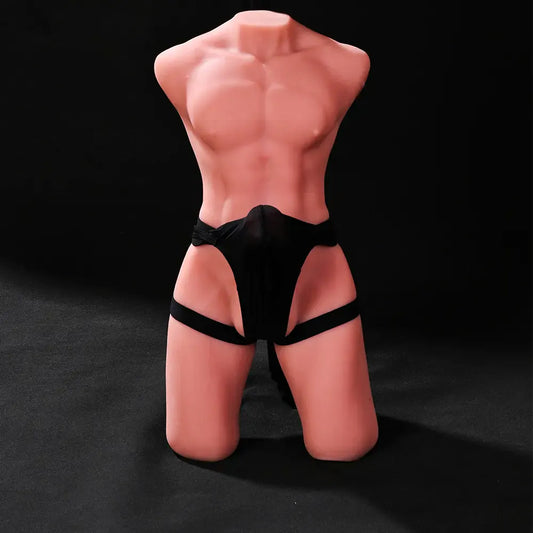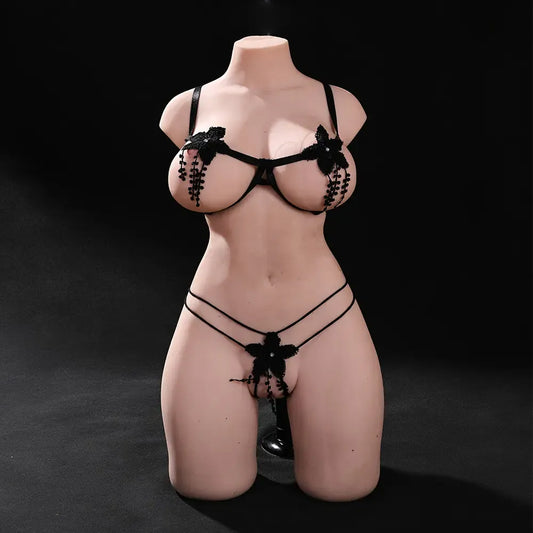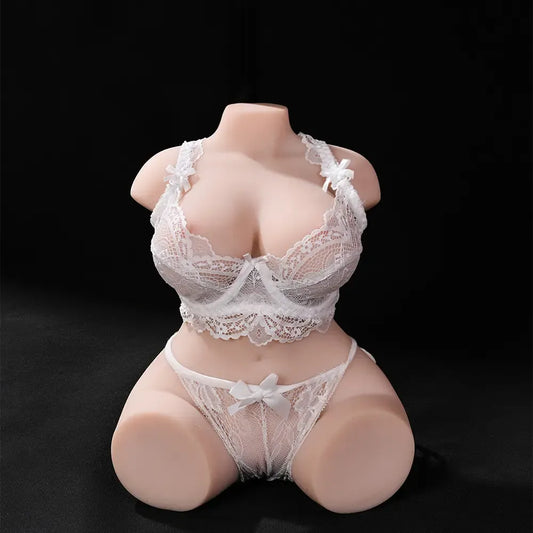How to Touch Your Clit Without Overstimulation: Simple Sensitivity Tips
The clitoris has more than 8,000–10,000 nerve endings crammed into a tiny space—twice as many as the head of the penis—making it the most sensitive erogenous zone in the human body. For many women, even the lightest direct touch can feel like an electric shock that forces you to pull away within seconds. If that sounds familiar, you’re not “too sensitive” or “broken.” You just haven’t learned the slow, layered approach that lets pleasure build instead of explode.
Why Does Your Clit Feel Overstimulated the Moment You Touch It?
Think of your clitoris like a speaker turned up to maximum volume before the music even starts. When you go straight in with firm pressure or fast movement, those thousands of nerve endings scream “TOO MUCH!” all at once.
“The clitoris is the only organ in the human body designed purely for pleasure, but its 8,000+ nerve endings can easily become hypersensitive with direct, intense stimulation—sometimes leading to discomfort or even temporary numbness.”
— Dr. Emily Nagoski, PhD, author of Come As You Are
The root cause isn’t oversensitivity; it’s starting at level 100 instead of level 10.
Are You Going Straight for the Most Sensitive Tip First?
Most women instinctively hunt for that little pearl the second their hand goes down. That’s actually the last place you want to begin.
The clitoris isn’t just the external glans you can see—it’s a wishbone-shaped structure with legs (crura) and bulbs that extend 9–11 cm inside the body, wrapping around the vagina. Start by waking up the entire system.
Place your whole palm over the entire vulva and simply rest there for 30–60 seconds. Then make slow, wide circles that cover the outer labia, inner labia, and the clitoral hood before you ever touch the glans itself. This spreads arousal evenly and prevents the “lightning bolt” feeling.
Does Dry Touch Ever Feel Good?
Friction without lubrication feels like sandpaper on wet silk. Many women get stuck in a loop: dry → uncomfortable → tense → even drier.
The fix is simple: lube first, touch second.
Water-based lubricant is body-safe and condom-compatible. Leading sexual wellness brands are unanimous on this point:
“Lube is not a sign something is wrong—it’s sex enhancement, like turning the lights down low or putting on music.”
— Alexandra Fine, co-founder & CEO of Dame Products
Put a drop or two on your fingers, warm it between them, and glide over the outer lips before heading inward. Once everything feels slippery and warm, the clitoris calms down dramatically.
Have You Ever Tried Touching Through Fabric?
Direct skin-on-skin too intense? Add a buffer layer.
Keep your cotton underwear on and gently press or circle over the fabric. The weave diffuses pressure so the sensation feels softer and more sustainable—many women can play for 20–30 minutes this way without overload.

Next-level version: lay a silk scarf, satin pillowcase, or soft T-shirt over your vulva and stroke through that. The different textures create entirely new sensations while protecting hypersensitive nerves.
How Hard Should You Actually Press?
Test this on your eyelid—that’s roughly 1/10th the sensitivity of your clitoral glans.
Your pressure progression should be:
- Feather-light (barely grazing the skin)
- Like stroking a baby’s hair
- Like gently pinching an earlobe
- Only then consider slightly firmer pressure
Golden rule: when it feels “just right,” you’re probably already pressing a little too hard. Stay in the zone of “mmm, I want more.”
Is Faster Always Better?
Brains need time to process pleasure. Studies show women typically require 20–40 minutes of continuous arousal to reach orgasm.
Try the 10-Second Rule: whatever motion you’re doing, keep it for at least 10 full seconds before changing.
- 10 seconds of still pressure
- 10 seconds of an ultra-slow circle (one circle = 5–6 seconds)
- 10 seconds of light tapping side-to-side
- 10 seconds of up-and-down gliding
This builds rolling waves instead of fireworks that burn out instantly.
Does Your Clit Ever Get Tired?
Yes—constant direct stimulation causes “clitoral fatigue.” It can swell, retract, or go temporarily numb.
When that happens, the worst thing you can do is keep rubbing. The smartest move: stop touching it entirely for 30–90 seconds.
Redirect blood flow elsewhere—caress your inner thighs, lightly pinch your nipples (they share brain real estate with the clitoris), or just cup your whole vulva without moving. Sensitivity almost always comes roaring back stronger.
Does Clitoral Sensitivity Change During Your Cycle?
Dramatically.
- Ovulation (days 12–16): estrogen peaks → clitoris is extra responsive → stick to feather-light touch
- Luteal phase (week before period): progesterone dominates → many women feel swollen and hypersensitive → avoid direct glans touch completely, focus on labia or vaginal entrance instead
Track your cycle for a month and you’ll stop wondering why some days feel amazing and others feel impossible.
Do Vibrators Make Overstimulation Worse?
Only if you use them wrong.
The classic mistake: turning a bullet vibrator to high and pinning it directly on the glans. Of course that hurts.
Correct beginner technique:
- Start on the lowest setting
- Hold it beside or above the clitoris, never right on top
- Use the side or handle of the toy, not the tip
- Move it away every 20–30 seconds (pulse, don’t pin)
Great toys for sensitive clits:
- We-Vibe Touch X (buttery-soft silicone, broad surface)
- Dame Pom (flexible, sits gently over the whole area)
- Womanizer Premium Eco (air-pulse instead of direct vibration)
- Evolova male sex doll (gentle pulsing thumps, smart pause for hypersensitive dits)
“Highly sensitive users should begin with broad, fluttering sensations rather than pinpoint pressure.”
— Womanizer Clinical Research Team
How Much of This Is Actually in Your Head?
A huge amount. Anxiety tells your pelvic floor to clench, which compresses nerves and amplifies discomfort.
Try this 60-second mindset shift before you start:
Close your eyes, breathe deeply, and repeat silently, “I deserve slow, delicious pleasure.” Each time a nice feeling appears, mentally say “thank you, more of that.” Positive reinforcement rewires your brain’s response surprisingly fast.
Can a Warm Bath Really Lower Sensitivity?
Yes—dramatically.
Soak in 38–40 °C (100–104 °F) water for 10 minutes. Increased blood flow causes mild swelling that partially “buries” the glans under its hood, dropping perceived intensity by 30–50 %. Countless women discover their first long edging sessions in the tub.
Dare to Play with Temperature?
Advanced users love this:
- Warm your vulva under the shower first
- Then switch to cool water or hold an ice cube in your cheek and exhale gently over the area
- Alternate warmed and chilled metal or glass toys
Temperature contrast temporarily stuns nerve endings, giving you more control.
How Should a Partner Touch an Oversensitive Clit?
Teach them one magic sentence: “Check in with me every 30 seconds.”
Step-by-step partner script:
- Whole palm resting, no movement—2 full minutes
- Huge lazy circles around the entire vulva
- Only move closer when you literally say “closer please”
- You can say “stop” or “back to thighs” any time without explanation
Great sex isn’t about enduring—it’s collaborative exploration.
Can You Train Yourself to Handle More Stimulation Over Time?
Yes, through edging practice.
Every session, bring yourself right to the brink of orgasm, then stop completely for 30–60 seconds. Repeat 5–10 times. After 4–12 weeks, most women notice they can tolerate stronger, longer, and more direct touch—and their eventual orgasms are significantly more intense.
FAQ: Most Common Questions About Clitoral Oversensitivity
Q: If my clit hurts the second I touch it, do I have an infection?
Not necessarily. Pure oversensitivity is extremely common. But if you have unusual discharge, odor, itching, or redness lasting more than a week, see a gynecologist.
Q: Are numbing gels or delay sprays safe for the clitoris?
Strongly not recommended. They can cause irritation, allergic reactions, and kill all sensation (including the good kind). Natural techniques are safer and more effective long-term.
Q: Can I touch my clit during my period?
Absolutely—many women have higher libido then. Just expect extra swelling and use even lighter pressure or indirect methods.
Q: Why can other women use strong vibrators for ages but I can’t last 10 seconds?
Nerve distribution varies hugely person-to-person. Some have more endings in the glans, others in the hood or internal structures. Keep experimenting—you’ll find your sweet spots.
Q: Will I become less sensitive after menopause?
Estrogen decline often reduces clitoral sensitivity slightly. Many women see this as a perk: they can finally enjoy direct, firm, prolonged stimulation they couldn’t handle before.
Your body isn’t asking you to tough it out—it’s asking you to slow down, listen, and treat its most exquisite part with the reverence it deserves. Start soft, stay patient, and watch how gently the pleasure unfolds.
Guess you'll like it
No comments


















0 comments